Neil deGrasse Tyson: Moon landing was a 'battle cry against communism'
Astrophysicist Neil deGrasse Tyson lets 'Fox News Saturday Night' in on some little-known research on his own life.
Man walked on the moon for the first time 55 years ago today, July 20, as America’s Apollo 11 mission achieved a dream bigger than Earth itself.
The world was riveted by the event.
An estimated 650 million people — nearly 20% of the entire human population at the time — watched the moon landing on July 20, 1969.
"That’s one small step for man, one giant leap for mankind," proclaimed U.S. astronaut Neil Armstrong as he stepped down the ladder of the Apollo 11 lunar module to become the first human to set foot on the moon.
He was followed soon after by Buzz Aldrin.
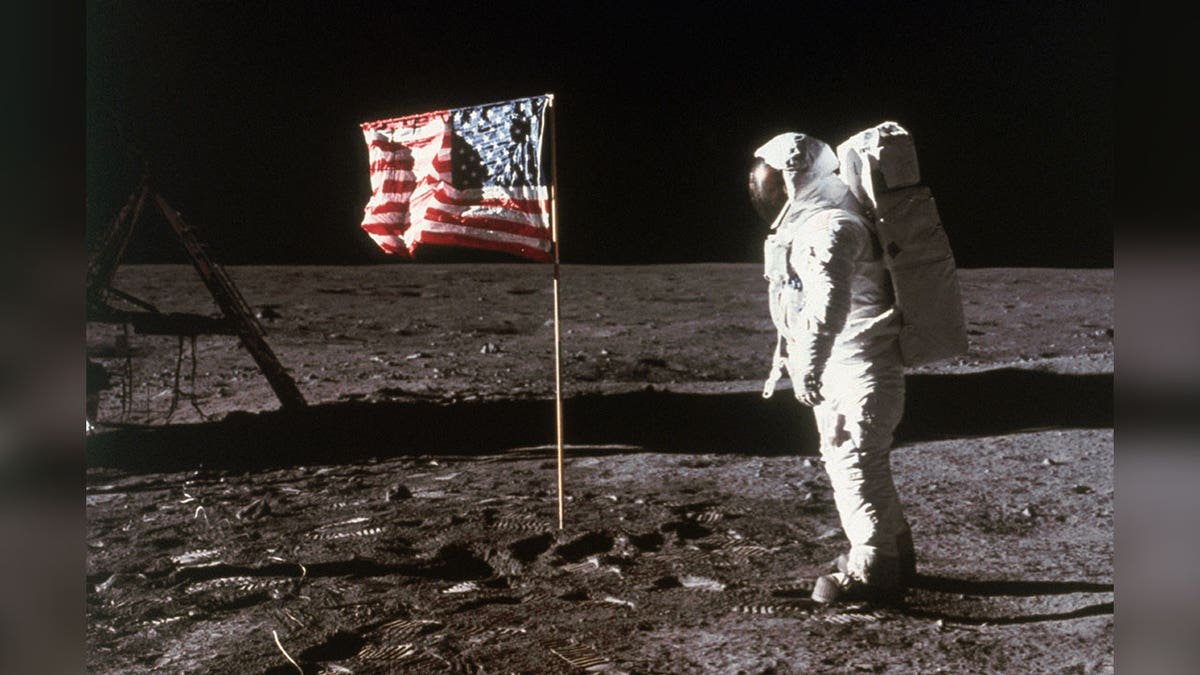
Astronaut Buzz Aldrin stands beside an American flag placed on the moon in 1969. (Bettmann/Contributor)
It was a landmark achievement in human history.
Meant for all humanity, it still stands as an undeniable example of American exceptionalism. It's an innate belief that no dream is too big, according to one noted historian.
"Americans historically get up in the morning with the belief that they have the ability and they have the capacity, they have the notion and the gumption and the spit and the polish, that they can make the future better for their children," World War II scholar and Ronald Reagan biographer Craig Shirley told Fox News Digital.
"And then they’ll work to achieve that dream. I don’t think that’s true in other nations."
"Americans historically get up in the morning with the belief … that they can make the future better for their children."
American exceptionalism doesn’t necessarily mean the U.S. is better than other nations, but it does mean "America is different," said Shirley.
Here are 7 examples of exceptional American ideas and achievements that changed the world.
1. Americans on the moon
Armstrong and Aldrin, both former American military pilots, were the first men to walk on the moon.
But not the last. The U.S. completed five more manned moon-landing missions.
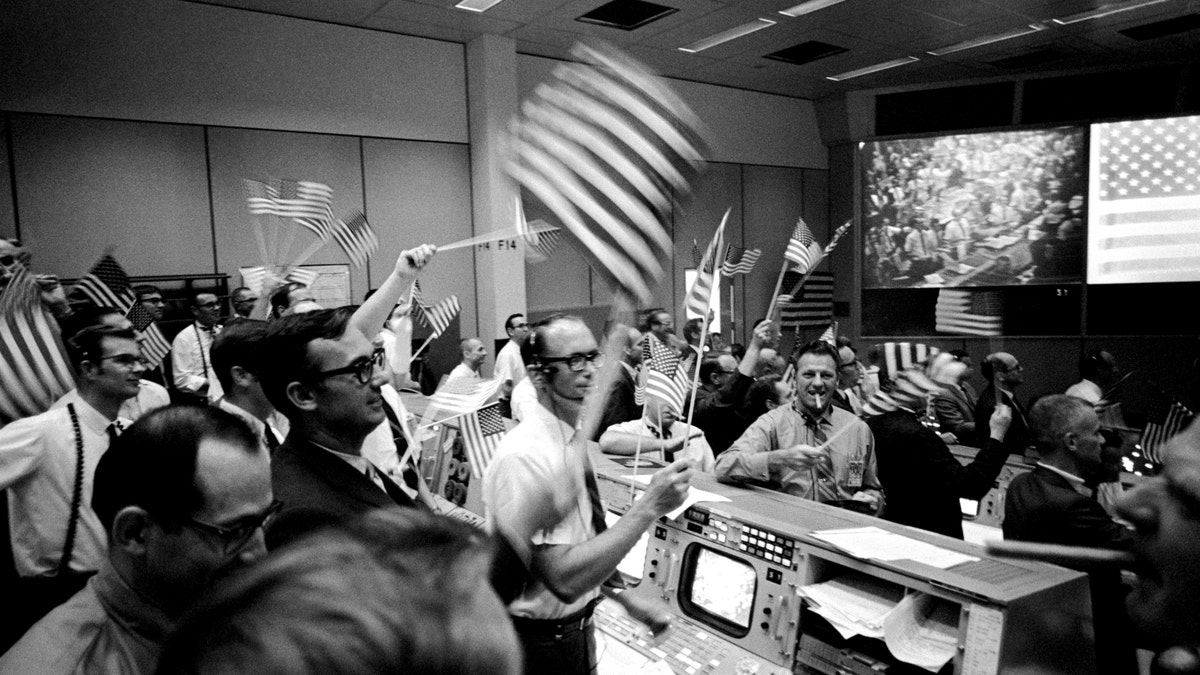
View of Mission Operations Control Room in the Mission Control Center (MCC), Manned Spacecraft Center (MSC), showing flight controllers celebrating successful conclusion of Apollo 11 mission. (HUM Images/Universal Images Group via Getty Images)
Illinois native and Apollo 17 astronaut Eugene Cernan, who died in 2017, was the last man to set foot on the lunar surface.
"This was one of the proudest moments of my life," Cernan said after planting the last American flag on the moon in Dec. 1972.
TRUMP FLAG PHOTO JOINS PANTHEON OF IMAGES THAT CAPTURE AMERICAN RESOLVE, ERASE POLITICAL DIVIDES
A total of 12 human beings have set foot on the moon.
All of them were Americans.
2. ‘All men are created equal’
The Declaration of Independence was more than just an audacious intellectual assault on the King of England’s authority.
Its signature statement that "all men are created equal" was an exceptional call for independence and individual liberty that undermined the entire world order.
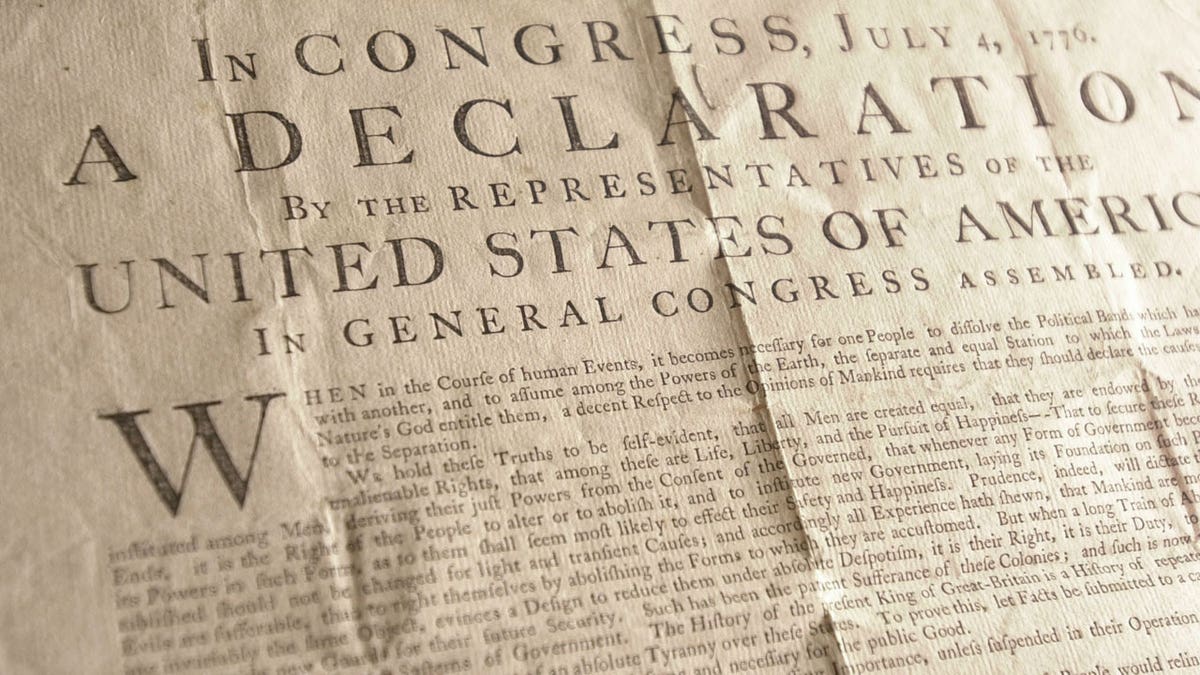
One of only 25 known surviving copies of the Declaration of Independence, which were printed July 4, 1776, sits on display at Sotheby's on June 22, 2000, in New York City. The document was bought at auction for $8.14 million on Sotheby's website, June 29, 2000. (Chris Hondros/Newsmakers via Getty Images)
Power since the dawn of human history had been claimed by hereditary rule or seized by the sword.
The Founding Fathers kicked sand in the face of those global bullies.
Human rights, they shouted, came from the Creator himself and His divine authority trumped the rule of king and tyrant.
"All men are created equal" was the most radical and most exceptional statement of political defiance in human history. It created a geopolitical earthquake that toppled global monarchies and reshaped humanity's relationship with governments.
"Since 1776, there have been approximately 120 declarations of independence made by different countries and different peoples," reports the website of Thomas Jefferson’s Monticello.
3. Olympic dominance
The modern Olympiad was dusted off from Ancient Greece and emerged in 1896 "to place sport at the service of the harmonious development of humankind," according to the Olympic charter.
The spirit of the games opposes outward displays of jingoistic patriotism. But one nation has easily dominated the international athletic competitions.

Michael Phelps is the most decorated Olympian in the history of the sporting event. (Reuters)
You don’t need to wave the flag. Simply look at the results.
The United States has captured 3,105 Olympic medals in all games, including 1,229 golden honors, according to Olympedia.org. In both cases, the American medal count is well ahead of No. 2 Soviet Union/Russia (1,204 medals, 473 gold).
America is at its best in the summer. The U.S. has topped the medal count in 16 of 28 Summer Olympics – including a streak of seven straight summer games heading into Paris.
4. ‘Arsenal of Democracy’
Germany and Japan fielded unstoppable armies in World War II that had conquered nearly all of Europe, Asia and North Africa by Dec. 1941.
The calculus of combat changed when Japan attacked Pearl Harbor. The unprecedented industrial capacity of the United States came barreling overseas.

Higgins Industries in New Orleans turned out thousands of amphibious landing craft in World War II, used to successfully deliver American troops to hostile beachheads around the world. Note the sign overhead the factory: "The guy who relaxes is helping the Axis." (National World War II Museum)
President Franklin D. Roosevelt called it America’s "Arsenal of Democracy."
The United States produced ships, tanks, artillery, trucks and every manner of food, supplies and equipment in numbers that overwhelmed the production of the Axis powers.
America also had the logistical capacity to ship equipment over land-sea supply lines up to 10,000 miles long and to feed, clothe and equip both Allied forces and hungry and homeless wartime refugees.
Germany's and Japan’s once fearsome armed forces were obliterated, conquered nations reclaimed, and the ruthless leadership of both nations toppled.
"America fights away games, we don't fight home games."
"America fights away games, we don't fight home games. And that requires us to power across two great moats called the Atlantic and Pacific Oceans," John Curatola, PhD, senior historian at the National World War II Museum in New Orleans, told Fox News Digital.
The U.S. was the only nation with the ability to project dominant combat power across two oceans in World War II — and still the only nation with that capability today, said Curatola.
5. Victory with ‘malice toward none, with charity for all’
Feelings of rage and revenge scarred the American psyche as the horrific human toll of the Civil War continued to climb. It’s still the deadliest war in U.S. history.
President Abraham Lincoln tempered the emotional fires with a concept that would prove unprecedented in the history of warfare.
Victory should be followed by forgiveness and compassion, rather than plunder and punishment.
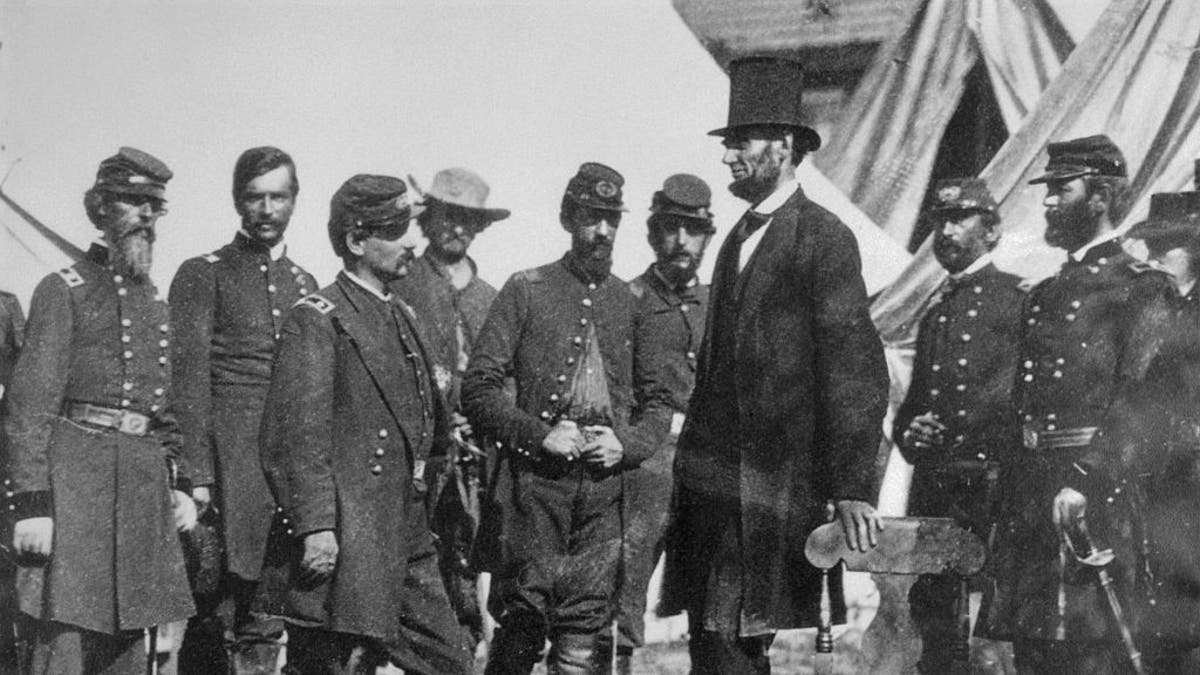
President Abraham Lincoln with General George B. McClellan at his headquarters at Antietam, Oct. 3, 1862. From left: General George W. Morell, Colonel Alexander S. Webb, General McClellan, scout Adams, Dr. Jonathan Letterman, unidentified officer, President Lincoln, Colonel Henry Hunt, General Fitz, John Porter, unidentified officer. (Getty Images)
"With malice toward none, with charity for all, with firmness in the right as God gives us to see the right, let us strive … to bind up the nation's wounds," Lincoln said in his second inaugural address.
The "deeply Christian concept" of war followed by forgiveness, said historian Shirley, shaped the Reconstruction Era after the Civil War, uniting a nation after unspeakable slaughter.
It has guided U.S. foreign policy in the nearly 200 years to follow, most notably after World War II.
"The only amount of land we have ever asked for in return is enough to bury those that did not return."
Curatola of the National World War II Museum cited a quote by Secretary of State Colin Powell to sum up the exceptional American concept of victory followed by charity and not malice.
"The only amount of land we have ever asked for in return is enough to bury those that did not return," said Powell before a crowd in England.
6. Global tech dominance
American innovation and entrepreneurship have made the United States the global leader of the digital age.
The world’s six largest tech companies — Apple, Microsoft, NVIDIA, Google, Amazon and Meta — were all founded by American entrepreneurs.
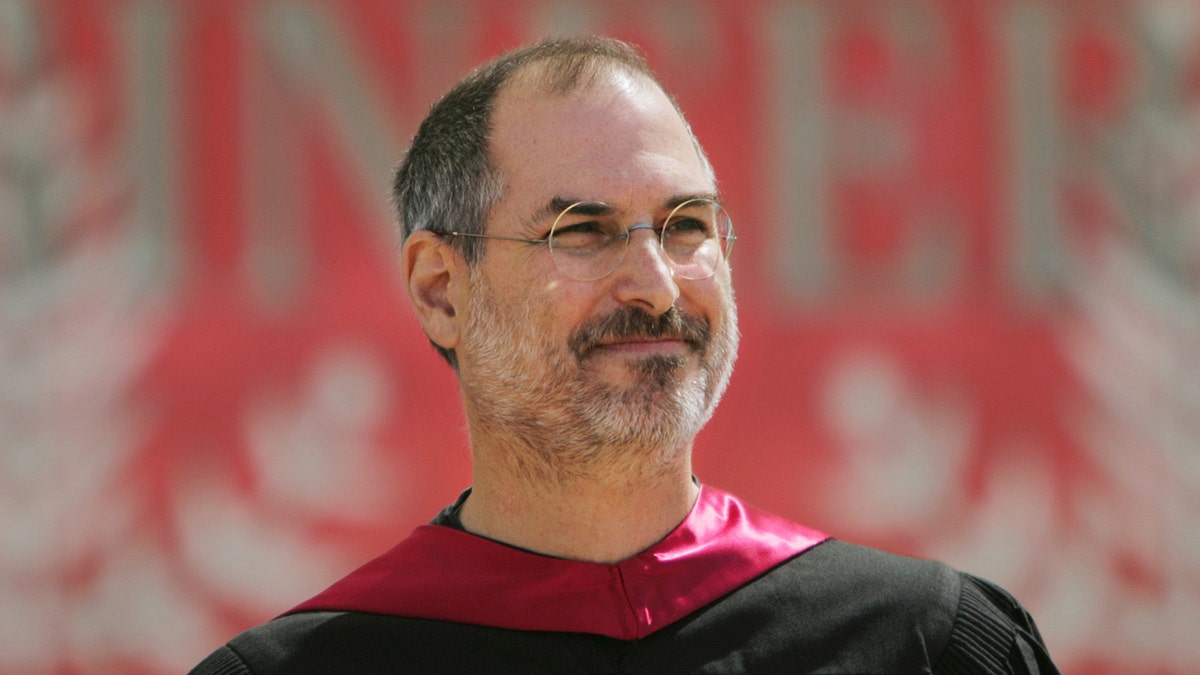
Steve Jobs speaks during the 114th commencement at Stanford University in Stanford, California, on Sunday, June 12, 2005. Steve Jobs, CEO of Apple and CEO of Pixar Animation Studios, gave the commencement address. (MediaNews Group/The Mercury News via Getty Images)
They have a combined market capitalization of nearly $15 trillion (with a "T") and impact the daily lives of billions of people around the world.
Late Apple co-founder Steve Jobs famously equated the advance of technology with a value at the heart of American exceptionalism: faith in the human spirit.
CLICK HERE TO SIGN UP FOR OUR LIFESTYLE NEWSLETTER
"Technology is nothing," Jobs said in an often-cited 1994 interview with Rolling Stone magazine.
"What's important is that you have faith in people, that they're basically good and smart — and if you give them tools, they'll do wonderful things with them. Tools are just tools. They either work, or they don't work."
7. Time zones
It took an American to propose the audacious idea that humans could harness time.
Humanity since the dawn of — well, time — kept time locally based upon the movement of the Earth around the sun. It was noon when the sun reached its highest point of the day – high noon.

Grand Central Terminal in midtown Manhattan opened in 1913, just 30 years after railroads pioneered the creation of time zones. (Kerry J. Byrne/Fox News Digital)
Charles Dowd, an education administrator from Saratoga Springs, New York, conceived a plan so radical it’s hard to believe there was an era when his vision for the world didn’t exist.
He created time zones.
For more Lifestyle articles, visit www.foxnews.com/lifestyle
He hatched the idea in 1883 as a way to bring sanity to train schedules as railroads began to sprawl across the vast North American continent. Each city kept its own time, with about 300 loosely regulated time zones across the United States.
Dowd's time zone concept quickly spread around the world. Time zones now regulate everything from airline schedules, to international commerce to the daily lives of 8 billion people.
"To regulate the time of this Empire Republic of the World is an undertaking of magnificent proportions," the Indianapolis Sentinel wrote in 1883.
CLICK HERE TO GET THE FOX NEWS APP
"The sun is no longer to boss the job. It is a revolt, a rebellion."
It's a rebellious example of audacious American exceptionalism: It's the belief that we can reach for the moon and tame time.









































